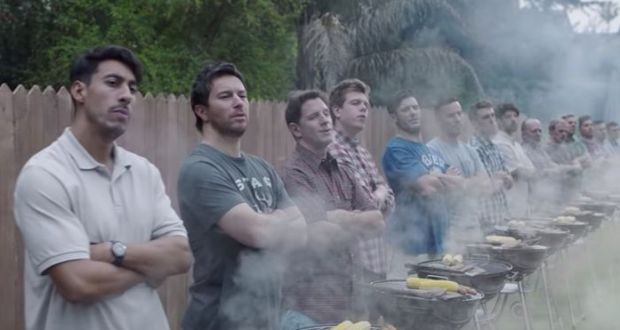Gillette defies industry norms to point out toxic masculinity to consumers
Image courtesy of nofilmschool.com
One of the most impactful scenes in the commercial, dads are shown chanting “boys will be boys” as they are watching their sons take part in destructive behavior, highlighting the societal standards that make violence seem acceptable.
As a 16-year-old girl in 2019, I am constantly surrounded by toxic masculinity.. Being a part of the generation that is continually pushing the boundaries of acceptance, it seems impossible that issues surrounding masculinity and its definition still exist.
I don’t know if I could tell you the last time I saw a commercial for a razor that was memorable, let alone impactful. However, Gillette’s latest push to show how men can have an impact on the way they treat each other and those around them has, embarrassingly, left me in tears.
Since originally stumbling upon this video, I have watched it more than ten times. As a woman, seeing how much thought and effort went into this message meant so much to me. The proactive approach to provide positive male role models is just the right push to try and take an active and fresh stance on the issues at hand. Instead of wagging a disapproving finger at the men caught up in these ideals, they are presenting a positive alternative: men of all ages can make a difference with their actions. By giving people good role models, there is a better chance that some negative behaviors discussed can be addressed.
The commercial shows multiple scenarios we all see every day, depicting men and their roles in sexualizing women, displaying a “tough guy” attitude and accepting the invisible societal standards surround them. Gillette’s catchphrase—“the best a man can get”—is brought into question. The commercial begs the question: are men today are living up to this standard?
As the video progresses, you see examples of men that are breaking the mold and being proactive. Throughout the advertisement, you see impressionable boys watching these scenarios unfold and learn what it is to be “the best a man can get.”
Attached to the video is a letter from the company describing their goal for the campaign. Gilette explains that brands such as theirs play a large role in influencing culture, and it is their responsibility to encourage positive definitions of masculinity. By doing so, they are allowing men to reassess the way they are representing themselves. They want to encourage men to be their best selves, promoting an attainable and healthy idea of what it means to be a man. It seems that no other brand has provided men the opportunity to redefine masculinity for themselves, as opposed to just showing a lifestyle in the consumers faces. As a brand, you have power over the consumers using and believing in your product.
Seeing a major corporation—especially one that gears their products toward men—step back and recognize the role that companies have in reinforcing this toxic masculinity is refreshing and necessary. Additionally, the video is masterfully produced, visually displaying the fatal flaws in everyday interactions.
The advertisement also sets Gillette apart from its competitors because it gives the consumer a new ideal to strive towards. Many advertisements regarding men’s grooming products try to sell the consumer a lifestyle that perpetuates toxic masculinity. The idea that buying their product will make you have more sex appeal, more business success or better athletic performance is only further perpetuated through these advertisements. Gillette, in contrast, is showing that the lifestyle they are promoting is one that allows men to be the best that they can be for themselves and those around them.
An advertisement cannot fix hundreds of years of societal pressures and norms. It would be unrealistic to assume so. But Gillette is doing something right by having the guts to step into the spotlight and own these issues and show that they are trying to have a positive impact.

When not playing goalie for the Staples Field Hockey team, Roxy Augeri ’20 is enthusiastically fulfilling her role in Inklings as Assistant Creative...


















































Terry brannigan Sr • Feb 6, 2019 at 10:34 pm
Nicely done